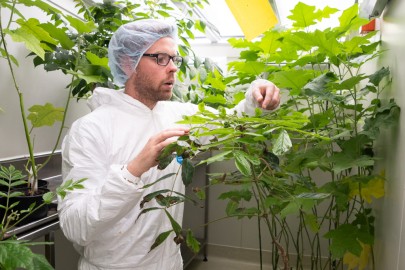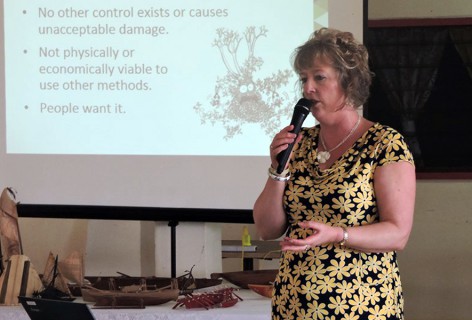Natural enemies, natural solutions
Natural enemies, natural solutions

Arnaud Cartier checking African tulip trees reared in the insect quarantine facility
The Cook Islands were the site of the first major release of biocontrol agents, specifically for the African tulip tree (Spathodea campanulata). Introduced to many Pacific islands as an ornamental plant, the trees pose a huge threat to island biodiversity across the region. Native to tropical Africa, this fast-growing, evergreen tree infests rainforests, out-competes native vegetation, and affects agricultural production.
Biocontrol agents include African tulip tree flea beetles (Paradibolia coerulea) and gall mites (Colomerus spathodeae), which are both specialist natural enemies of the African tulip tree. The beetles feed on the leaves and the mites form leaf galls, known as erinea, which stunt new growth. Working together, these two natural enemies will reduce this invasive tree’s competitive ability. This work is being undertaken with assistance from the National Environment Service, the Ministry of Agriculture, and members of the Te Ipukarea Society and the Natural Heritage Trust. The mites have also been supplied to Tonga and Vanuatu.
African tulip tree was also determined to be the top priority for Fiji, where the NENS team of Lynley Hayes, Dr Quentin Paynter, and Temo Talie ran a weed prioritisation workshop with representatives from a range of government and regional institutions, including Fiji’s Biosecurity Authority, the Department of the Environment, The Pacific Community, the University of the South Pacific, and Fiji National University. Staff at the Ministry of Agriculture at Koronivia Research Station, in Suva, will support the work needed to import, mass rear, and release the African tulip tree mite and beetle.
While delivering the African tulip mites to Vanuatu, Manaaki Whenua researchers also visited the Vanuatu Agricultural Research and Technical Centre to view trials underway to optimise conventional control of wild peanut (Senna tora). This work will help farmers while natural enemies are being sought for this key pasture weed. The team provided training on how to analyse photos using software, which will be needed to assess the trials and other future project activities.
The NENS team has also begun research and risk assessments into the shrub Solanum torvum (known by many names, including pico and prickly solanum), which is having a major impact on the beef industry in Vanuatu. Native to the Antilles, this prickly shrub can form dense, impenetrable thickets.
Our recently completed molecular study has shown that populations of S. torvum in the Pacific are genetically very similar and originate from the Antilles, confirming the Caribbean to be the best place to look for natural enemies. Testing of a pico beetle (Leptinotarsa undecimlineata) obtained from Jamaica has ended, and since the beetle is both damaging and highly host specific, an import risk assessment is now being prepared for Vanuatu.




